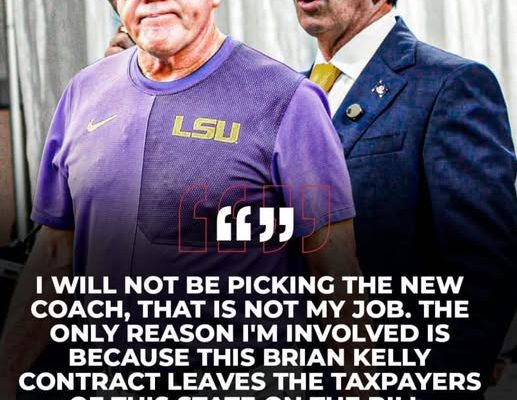The future of LSU Tigers football has entered a defining moment. With the abrupt departure of Brian Kelly and the looming search for his successor, Jeff Landry, the governor of Louisiana, has publicly signalled that the next coach will not only face a significantly different contract but will also be hired under a leadership structure that bares little resemblance to the past. What this signals is a seismic shift at the intersection of athletics, accountability and public oversight — one that may well reshape the Tigers’ coaching paradigm for years to come.
Kelly’s exit followed a home blow‑out loss to Texas A&M Aggies (49‑25), a deeply disappointing season for a program accustomed to national‑title aspirations. Reuters+2nypost.com+2 His original contract, a sprawling 10‑year, US $95 million agreement, has left LSU with a potential buyout burden of approximately US $54 million. Reuters+2The Guardian+2 It is this financial fallout — and the ensuing public scrutiny — that appears to have galvanized Landry’s intervention.
For years, LSU’s athletic director, Scott Woodward, had been responsible for high‑stakes coaching hires and large financial commitments. Those moves included enormous contracts not only at LSU but during his days before — for example, his involvement at Texas A&M Aggies with the Jimbo Fisher deal that generated a buyout figure hovering around US $70 million. Yahoo Sports Landry has been clear: he is unwilling to let a repeat of that pattern unfold. He has gone so far as to declare that Woodward will not select the next coach, that A) the institution’s Board of Supervisors will oversee the process instead, and B) the contract for the next coach will be “patently different.” SI+2Fox News+2
The implication is twofold. First, the contract structure will be stripped of excessive guarantees or open‑ended terms that leave the university dangling in huge buyout obligations. Landry put it succinctly: the next deal will include clear performance metrics, he said, because “I’m tired of rewarding failure … and then leaving the taxpayers to foot the bill.” SI+1 This means the next head coach may have far more of their compensation tied to deliverables – wins, postseason appearances, graduation rates, adherence to program standards – rather than purely time on the job.
Second, the hiring process and the chain of command will shift. The governor’s rhetoric suggests that the next coach won’t simply report to the athletics director but will instead be embedded within a structure more directly accountable to the university’s governing board and, arguably, the state. It reflects a move toward governance oversight beyond athletics department autonomy.
Why is this change so noteworthy? For one, it speaks to the growing cost of major college athletics and the public perceptions around them. LSU is a state institution whose athletic programmes often draw in significant interest, not just from donors but from taxpayer‑funded facilities, infrastructure and media rights. When large contracts and buyouts are involved, the public scrutiny intensifies — and elected officials such as Gov Landry feel compelled to intervene when things go awry. The Kelly contract’s size and its lack of hoped‑for championships created a tangible tension between expectation and outcome, between investment and return.
But there are also programme implications. The old paradigm of offering massive guaranteed contracts – long terms, big exit clauses, lofty salaries regardless of performance – may be over. The new paradigm, as Landry hints, is likely to favour shorter terms, more accountability, performance escalators, and perhaps a bigger emphasis on the coach’s fit within the university ecosystem (academics, culture, compliance) rather than simply the headline bonus numbers.
Further, the leadership shake‑up at LSU adds to the sense of change. Woodward’s leadership has been questioned, and he ultimately moved on from LSU — this departure aligns with the governor’s insistence on change at the top of the athletic department. ESPN.com To fill the void, interim leadership will steer the search for the next coach, under the oversight that Landry now endorses.
All of this raises key questions for potential candidates. Will the next coach accept a deal with fewer guarantees? Will they be comfortable with heavier scrutiny, more direct oversight from the Board, and perhaps less autonomy than coaches have enjoyed in the past? Will they be prepared to deliver on performance metrics quickly, in a program that was built for — and expects — national contention? And importantly, will they be able to thrive under a governance model that may require them to engage more directly with state stakeholders, boosters, donors and fans in a highly visible fashion?
From a recruiting standpoint, this could shift how LSU positions itself. Historically, LSU has been able to attract big‑name coaches with lavish contracts and promise of resources. The signal now is that while the resources may remain, the financial terms will be less open ended and the coaching hire will be judged more critically. That may deter some candidates who expect high guarantees and the “long leash” model, but it might equally attract those who are confident in their ability to deliver immediately and want to reinforce a culture of accountability.
What does this all mean for LSU’s football future? If the programme and its stakeholders play this right, it could mark the beginning of a steadier, more sustainable era — one where the coach is aligned not just with the football field but with the broader mission of the university, where performance is tied to compensation, where oversight checks excess, and where the public can feel more assured that commitments are grounded in outcomes. If done incorrectly, however, the programme risks sending the wrong message: that instability, external interference and shorter leashes could make top‑tier candidates hesitant. The balance will be tricky.
In the immediate term, the transition will likely be messy. LSU must complete a national search, likely under interim leadership, with the new contract terms under development. The governing board will need to set criteria not just for the hire but for the contract terms, oversight mechanisms and performance metrics. Booster and donor buy‑in will be vital, because high‑level coaching hires still require significant investment in staff, facilities, recruiting and support infrastructure. And public relations will be central — LSU will need to reassure fans, alumni and the broader Louisiana public that this change.



